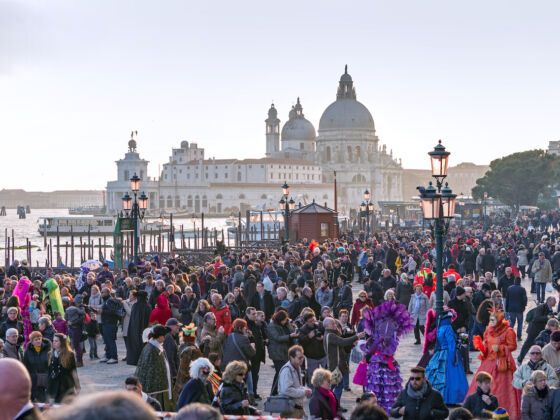When you book a trip to the beach, your favorite city, or for an exotic jungle adventure, how often do you consider the impact that your actions will have on your destination? Unfortunately, that seems to be a secondary concern of many travelers — if it enters their minds at all — and, as a result, locals in some of the places that rank highest on travel bucket lists are turning against the droves of people who flock to them every year.

The Responsibilities Travelers Have to the Places They Visit
As residents of cities and countries which attract a lot of travelers have begun protesting the decline in their quality of life caused by excessive tourism, governments have reacted with policies aimed at limiting visitors. Barcelona and Venice are looking at ways to reduce tourist numbers, including by limiting available accommodation; Iceland and Norway want to limit visitors to certain natural wonders whose environments could be damaged by increasing tourism; Santorini and Venice want further restrictions on cruise ship traffic; and some Thai islands are drastically limiting tourists’ access, if not banning them altogether.
If the presence of tourists is fueling this much anger and resentment, it’s our responsibility to look at the actions we take when we’re abroad to see if we’re doing all we can be respectful of local cultures and not being obnoxious in a vacation destination that is also the home to thousands or sometimes even millions of people. If people came to our cities and weren’t respectful, we wouldn’t be very happy about it, so we shouldn’t engage in that behavior ourselves.
Destructive hordes and bad role models
In Sydney and Melbourne, there are news stories every year about the trash left behind by backpackers after Christmas beach parties with six-figure cleanup bills. Young British tourists also have a particularly bad reputation across the Mediterranean for their obnoxious and destructive behavior on party trips, while Americans are known for being ignorant of local cultures and peoples. Increasing rage is also being directed at the rising number of Chinese tourists who arrive in large tour groups, some of which have had to be told not to defecate in the gardens of the Louvre, and have had run-ins with vandalism, such as at an ancient Egyptian temple in Luxor.
And, unfortunately, young people may not have the best travel role models. Teens and young millennials are far more likely to be watching YouTube than regular television, where some of the most popular vloggers haven’t been setting positive examples. Online video incentivizes people to be controversial and when that’s combined with travel, the results can be disastrous.
For many YouTube stars, a trip abroad is not an opportunity to learn about a different culture, but to take their usual antisocial antics to the next level. A few months ago, criticism was leveled at Logan Paul, one of YouTube’s biggest names, for filming a man who had committed suicide in a notorious Japanese forest at the foot of Mount Fuji. However, his other Japan vlogs demonstrated the general disrespect that he showed for others and how he saw Japan as his playground, not the home of millions of people, and, by extension, gave a terrible portrayal of how to travel to his young, impressionable audience.
Paul threw Pokeballs at regular Japanese people — including a police officer — smashed a Gameboy and tried to return it, waved seafood in people’s faces before leaving it on the back of a taxi, and so much more. While there are dedicated travel vloggers who don’t engage in this kind of behavior, there are a lot of people like Paul who use travel to add an exciting twist to their general trend of disrespectful behavior that keeps people watching and subscribing.
Tourists pushing out locals
However, being a responsible traveler is not just about how we act when interacting with others in foreign destinations, but also about the choices we make when booking tours, accommodations, and deciding how we get around. Many of the cities looking at ways to reduce, or at least control, tourism are also leading the charge to effectively regulate the on-demand economy, including chief players Airbnb and Uber.
If you only read the promotional materials of these companies, the issues they present may not be apparent, but their operations and how they eschew the rules of traditional industries are causing a lot of problems in many cities. Residents in Barcelona have complained about apartment buildings that have become dominated by Airbnb rentals, making living a nightmare for long-term residents who have to deal with the noise of short-term visitors on party trips. The mayor of Paris’ first arrondissement called Airbnb “a catastrophe for central Paris” for contributing to population declines because people can make more money from short-term rentals than housing long-term tenants.
These aren’t baseless complaints from people who hate technology companies and can’t accept the future. A recent study of New York City’s housing market provided further evidence to back the claim that Airbnb has taken units off the market and contributed to higher rents. The problem is that there used to be a clearer distinction between housing and tourist accommodation, but now it’s much easier for the former to be converted into the latter. At the same time, there’s a movement of people into major cities, creating higher demands for housing.
When we leave our homes to venture out into the world and see new places, we have to remember that we aren’t simply going to a destination, but often we’re visiting a place that many people call their home, and we have a responsibility to treat their hometown or city as we would want visitors to treat our own. That means being considerate in our actions, but also in how we travel so as not to make life more difficult for the people who will remain in the places we visit once we’ve returned home.